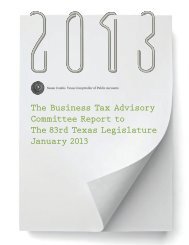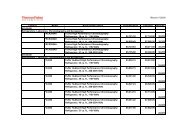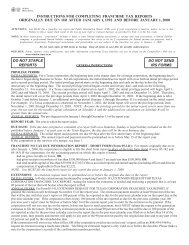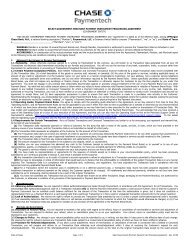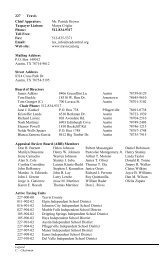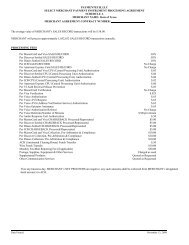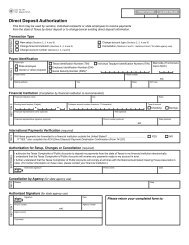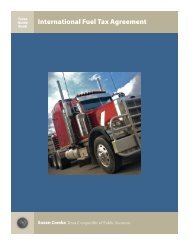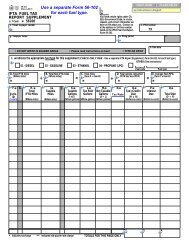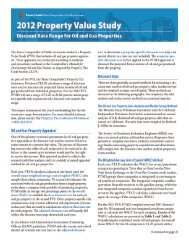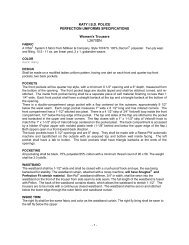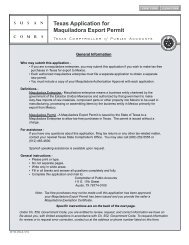96-143 Motor Vehicle Rental Tax Guidebook - Texas Comptroller of ...
96-143 Motor Vehicle Rental Tax Guidebook - Texas Comptroller of ...
96-143 Motor Vehicle Rental Tax Guidebook - Texas Comptroller of ...
You also want an ePaper? Increase the reach of your titles
YUMPU automatically turns print PDFs into web optimized ePapers that Google loves.
Exemptions, Bad Debts and Reimbursements<br />
Exemptions<br />
There is no tax on the rentals listed below. The receipts from<br />
such rentals must be included as total contract receipts on<br />
the rental return, but are not counted as part <strong>of</strong> your taxable<br />
contract receipts.<br />
The following types <strong>of</strong> rentals are exempt from tax.<br />
• <strong>Rental</strong>s to a public agency – a public agency is an<br />
instrumentality <strong>of</strong> the U.S. government or a department,<br />
commission, board, <strong>of</strong>fice, institution or other<br />
agency <strong>of</strong> this state or <strong>of</strong> a county, city, town, school<br />
district, hospital district, water district or other special<br />
district or authority or political subdivision created by<br />
or under the <strong>Texas</strong> constitution or statutes.<br />
• <strong>Rental</strong>s to a church or religious society – no tax is due<br />
if the vehicle is designed to carry more than six passengers<br />
and at least 80 percent <strong>of</strong> the vehicle’s operating<br />
time is used to provide transportation to and from<br />
church or religious services or meetings. A vehicle<br />
rented for the <strong>of</strong>ficial or personal use <strong>of</strong> a minister is<br />
not exempt.<br />
• <strong>Rental</strong>s for re-rental – if you rent a vehicle to someone<br />
who will then re-rent it to others, do not collect rental<br />
tax.<br />
• <strong>Rental</strong>s to farmers and ranchers – there’s no tax on<br />
rentals <strong>of</strong> a trailer, semi-trailer or a farm machine.<br />
• <strong>Rental</strong>s to timber operators – there’s no tax on rentals<br />
<strong>of</strong> a trailer, semi-trailer or timber machine.<br />
• <strong>Rental</strong>s to a child-care facility – no tax is due when<br />
renting a vehicle to a qualified residential child-care<br />
facility to be used primarily to transport children residing<br />
in the facility. A qualified residential child-care<br />
facility means one licensed under Chapter 42 Human<br />
Resources Code to provide residential care 24 hours<br />
a day in a single residential group to children who<br />
do not require specialized services or treatment and<br />
children who are emotionally disturbed.<br />
There is no exemption for vehicle rentals to a non-pr<strong>of</strong>it or<br />
public service organization, even if the organization is funded<br />
by a public agency.<br />
Exemption Certificate<br />
When making an exempt rental, you must attach an exemption<br />
certificate (Form 14-305, back) to the rental contract.<br />
The certificate must be signed by an authorized representative<br />
<strong>of</strong> the group or organization renting the vehicle. (See page 8<br />
for an acceptable form <strong>of</strong> an exemption certificate. You can<br />
reproduce this form in any size compatible with your recordkeeping<br />
requirements.)<br />
If you frequently make exempt rentals to a single person or<br />
organization, you do not have to get an exemption certificate<br />
for each rental. However, you must have a method <strong>of</strong> correlating<br />
specific invoices or rental contracts to that organization’s<br />
signed exemption certificate in your files.<br />
If you do not get an exemption certificate when you rent a<br />
vehicle tax free, you are responsible for proving the rental was<br />
exempt.<br />
Bad Debts<br />
You can use bad debts to reduce the amount <strong>of</strong> your rental tax<br />
liability. Bad debts are those that are determined uncollectable,<br />
written <strong>of</strong>f as uncollectable in your books, and claimed as a bad<br />
debt deduction for federal income tax purposes.<br />
To reduce your tax liability, you can deduct a bad debt from<br />
your gross rental receipts. If the bad debt includes taxable<br />
and non-taxable receipts, you can deduct only the taxable<br />
amount from gross rental receipts. If you’ve already remitted<br />
the tax to the <strong>Comptroller</strong>’s <strong>of</strong>fice, you can claim credit<br />
for the tax paid on the uncollectible charge on a current tax<br />
return or file an amended return for the period the bad debts<br />
were written <strong>of</strong>f.<br />
To support a claim for a bad debt deduction or credit, you<br />
must keep records <strong>of</strong> the date <strong>of</strong> the rental, the name and address<br />
<strong>of</strong> the customer, the amount the customer agreed to pay,<br />
any amount on which you have already paid tax, payment<br />
or other credit applied to the account, and evidence that the<br />
amount has been legally charged <strong>of</strong>f as a bad debt for federal<br />
income tax purposes.<br />
Any amount claimed as a bad debt cannot be used as a credit<br />
against the minimum gross rental receipts tax owed on a<br />
vehicle.<br />
Reimbursement<br />
If you pay motor vehicle sales or use tax on a rental vehicle,<br />
you can retain the rental tax you collect to recover the tax<br />
you’ve paid.<br />
You cannot recover more tax than you paid when you registered<br />
the vehicle. For example, if you paid $1,000 in motor<br />
vehicle sales or use tax at registration, you can retain no more<br />
than $1,000 in rental tax.<br />
To recover the tax you’ve paid, deduct the gross receipts derived<br />
from the rental <strong>of</strong> the vehicle from either line 2 (receipts<br />
from short term contracts) or line 6 (receipts from long term<br />
contracts) on your <strong>Texas</strong> <strong>Motor</strong> <strong>Vehicle</strong> <strong>Rental</strong> <strong>Tax</strong> Return<br />
6 <strong>Motor</strong> <strong>Vehicle</strong> <strong>Rental</strong> <strong>Tax</strong> <strong>Guidebook</strong>



